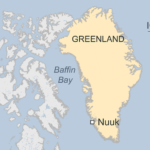 Ok, there has been a lot of talk about the Cheetos Dusted Moron wanting to “buy” Greenland from Denmark. It’s a stupid conversation. Let’s put aside that it would probably cost quadrillions of dollars. this isn’t the days of the Louisiana purchase maintaining a shit ton of unexplored land that they use as trade objects for revenue for fighting wars later on. It’s 2025, everything has been explored and it being utilized. So lets actually take a look at why there is no chance Denmark would ever even entertain the idea of selling Greenland to the U.S.
Ok, there has been a lot of talk about the Cheetos Dusted Moron wanting to “buy” Greenland from Denmark. It’s a stupid conversation. Let’s put aside that it would probably cost quadrillions of dollars. this isn’t the days of the Louisiana purchase maintaining a shit ton of unexplored land that they use as trade objects for revenue for fighting wars later on. It’s 2025, everything has been explored and it being utilized. So lets actually take a look at why there is no chance Denmark would ever even entertain the idea of selling Greenland to the U.S.
Greenland, the world’s largest island, has long held a unique position in global geopolitics. Officially an autonomous territory within the Kingdom of Denmark, it is not only a land of breathtaking natural beauty but also a region of immense strategic importance. For Denmark, Greenland represents a key asset, offering economic, military, and geopolitical advantages. This article explores why Greenland is such a strategic location for Denmark, examining its geography, resources, and evolving role in a changing global landscape.
Geography: The Key to Greenland’s Strategic Significance
Proximity to the Arctic
Greenland’s position in the North Atlantic and Arctic Oceans makes it a vital geographic outpost. The island is strategically located between North America and Europe, with its northern coast extending into the Arctic Ocean. This positioning provides Denmark with a foothold in one of the most geopolitically contested regions in the world.
As climate change accelerates the melting of Arctic ice, new shipping lanes, such as the Northwest Passage and the Northern Sea Route, are becoming navigable. These routes significantly shorten travel times between major global markets, making Greenland an essential waypoint for maritime traffic.
A Gateway to North America
Greenland’s proximity to North America, particularly Canada and the United States, enhances its strategic importance. The island’s geographic position has historically made it a valuable military asset. During World War II, Greenland was a crucial base for monitoring German U-boat activity in the Atlantic. Later, during the Cold War, the U.S. established the Thule Air Base in Greenland to monitor Soviet missile activity and provide early warning of potential attacks.
Today, Greenland’s location continues to make it a critical asset for Denmark and its NATO allies, particularly as global power dynamics shift.
Natural Resources: A Wealth of Untapped Potential
Minerals and Rare Earth Elements
Greenland is believed to possess vast mineral resources, including gold, copper, zinc, and uranium. Of particular interest are its rare earth elements (REEs), which are critical for producing advanced technologies such as smartphones, wind turbines, and military equipment. Greenland’s REE reserves are among the largest in the world, making it a potential key player in the global supply chain for these critical materials.
As nations, including China and the United States, seek to secure access to rare earths, Greenland’s resources have gained increasing attention. For Denmark, maintaining sovereignty over Greenland ensures control over these valuable assets and prevents other nations from monopolizing access.
Oil and Gas Reserves
Beneath Greenland’s icy waters lie significant reserves of oil and natural gas. While exploration has been slow due to environmental concerns and technical challenges, the potential for energy extraction remains a major draw. In a world increasingly focused on energy security, Greenland’s hydrocarbon reserves could become a significant asset for Denmark, offering both economic benefits and geopolitical leverage.
Fisheries and Marine Resources
Greenland’s surrounding waters are rich in fish, particularly shrimp and halibut, which are vital to its economy. The territory’s fishing industry accounts for the majority of its exports, providing a stable revenue stream. For Denmark, Greenland’s fisheries contribute to the Kingdom’s overall economic strength and ensure access to valuable marine resources.
Military Importance: Greenland’s Role in Global Security
The Thule Air Base
The Thule Air Base, established in 1951 and located in northern Greenland, is a cornerstone of NATO’s defense strategy. Operated by the United States under an agreement with Denmark, the base serves as a vital hub for early missile warning systems and space surveillance. Its location provides unparalleled access to monitor activities in the Arctic and detect potential threats from Russia or other adversaries.
The base underscores Greenland’s importance to Denmark’s alliance with the United States and NATO. By hosting such a critical military installation, Denmark reinforces its position as a key player in transatlantic security.
Arctic Militarization
As Arctic nations, including Russia and China, expand their military presence in the region, Greenland’s strategic value has grown. Russia has reopened Soviet-era military bases in the Arctic and is investing heavily in icebreakers and other Arctic infrastructure. Meanwhile, China has declared itself a “near-Arctic state” and seeks to establish a foothold in the region through investments and partnerships.
Greenland offers Denmark a platform to counterbalance these activities and assert its sovereignty. Maintaining a military presence and collaborating with NATO allies ensures that Greenland remains secure and that Denmark retains influence in the Arctic.
Geopolitical Leverage: Greenland in International Relations
The U.S.-Denmark Relationship
Greenland’s strategic importance has strengthened Denmark’s relationship with the United States. The presence of the Thule Air Base and Greenland’s proximity to North America make it a critical component of U.S. defense strategy. This alignment has elevated Denmark’s standing within NATO and bolstered its influence in transatlantic relations.
The 2019 suggestion by then-U.S. President Donald Trump to purchase Greenland highlighted its strategic value. While Denmark firmly rejected the idea, the proposal underscored Greenland’s importance to U.S. interests and the potential leverage it provides to Denmark in negotiations with its allies.
Arctic Council and Regional Influence
Greenland’s geographic position gives Denmark a seat at the table in Arctic affairs. As a member of the Arctic Council, Denmark plays a significant role in shaping policies related to environmental protection, resource management, and indigenous rights in the region. Greenland’s inclusion in the Kingdom of Denmark ensures that it has a voice in these critical discussions and strengthens Denmark’s influence in Arctic governance.
Balancing Chinese Interests
In recent years, China has shown growing interest in Greenland, particularly its rare earth elements and infrastructure projects. Chinese companies have attempted to invest in mining and construction projects, raising concerns among Denmark, the United States, and other Western allies about potential Chinese influence in the region.
Denmark has carefully managed these dynamics, balancing Greenland’s economic aspirations with broader geopolitical concerns. By maintaining sovereignty over Greenland, Denmark ensures that it can monitor and regulate foreign investments, preventing any single nation from gaining undue influence in the Arctic.
Environmental and Scientific Significance
Climate Change and the Melting Ice Cap
Greenland is at the forefront of climate change, with its ice cap melting at an alarming rate. This phenomenon has significant global implications, contributing to rising sea levels and altering ocean currents. For Denmark, Greenland’s role as a center for climate research enhances its international reputation as a leader in environmental science.
Greenland’s unique environment also makes it a hub for scientific research. The island’s ice cores provide valuable data on historical climate patterns, while its geology offers insights into the Earth’s history. Denmark’s stewardship of Greenland allows it to support and benefit from these research efforts.
Renewable Energy Potential
As the world transitions to renewable energy, Greenland’s vast hydropower potential presents an opportunity for sustainable development. The island’s numerous rivers and waterfalls could generate significant amounts of clean energy, reducing reliance on fossil fuels and contributing to Denmark’s green energy goals.
Autonomy and the Future of Greenland-Denmark Relations
Greenland’s Push for Independence
While Greenland remains an autonomous territory, there is a growing movement for independence. Greenlandic leaders have expressed a desire for greater control over their natural resources and economic future. However, the path to independence is complex, as Greenland relies heavily on Danish subsidies and would face significant challenges in achieving economic self-sufficiency.
For Denmark, Greenland’s push for independence raises important questions about the future of their relationship. Maintaining a strong partnership with Greenland is essential to preserving its strategic advantages while respecting the island’s autonomy.
A Balancing Act
Denmark’s approach to Greenland reflects a careful balancing act. On one hand, it seeks to support Greenland’s aspirations for greater autonomy and economic development. On the other hand, it must ensure that its own strategic interests, particularly in the Arctic, are protected. This dynamic will continue to shape the relationship between Denmark and Greenland in the years to come.
Conclusion: Greenland’s Enduring Strategic Value
Greenland’s unique geography, abundant natural resources, and military significance make it a cornerstone of Denmark’s global strategy. As the Arctic grows increasingly important in global geopolitics, Greenland’s value will only continue to rise. For Denmark, maintaining sovereignty over Greenland ensures access to its resources, strengthens its alliances, and reinforces its influence in international affairs.
At the same time, Denmark faces the challenge of balancing its own interests with Greenland’s aspirations for greater autonomy. Navigating this relationship will be key to ensuring that Greenland remains a vital part of the Kingdom of Denmark while also allowing its people to thrive.
In the ever-changing landscape of global politics, Greenland stands as a testament to the enduring importance of geography, resources, and diplomacy. For Denmark, it is not just a territory—it is a strategic jewel, offering opportunities and challenges that will shape the nation’s future for decades to come.
So in conclusion. Dear 24 Hour News stations. Please just shut the fuck up about this. It’s assinine to even bring up.
This post has already been read 137 times!









